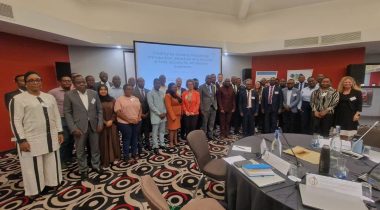
Rachel Etter-Phoya ■ Taxes, a matter of life or death

You’d be forgiven if you clicked on the corporate governance structure of a multinational company and mistook the download plans for a world tour itinerary. You may find yourself starting in London on your way to Lilongwe, with layovers in Amsterdam, Road Town and Dubai, wondering how much of Virunga National Park would need saving for your jetsetting. The Man in Seat Sixty-One would be hard pressed to find a rail route for you, even if you had all the time in the world.
Places, spaces, not usually connected, at least not by The Lonely Planet or your favourite travel Vlogger, are often top destinations for subsidiaries of some of the largest multinational corporations. And it’s not because Meta’s sharing your data across field and fountain. Nor is it because Glencore’s choosing a convoluted route for copper. Rather, hidden carefully within a multinational’s books, are the footprints of finance, seeking the path of least resistance for profit.
Dodging taxes through dodgy havens
This quest to dodge taxes is not new, but it’s taken on epic proportions in the last century with digitalisation, and the rise of the multinational corporation and its accomplice, the tax haven. Every year, countries are losing an estimated $312 billion due to cross-border corporate tax abuse, and as much as 40% of corporate profits are shifted into tax havens.
Tax havens are not only, or even primarily, the paradise island, offshore sunny, sandy holiday destinations, but countries, cities and even smaller zones set up to give non-residents—both companies and people—a chance to escape the tax rules of the country where they actually do most of their business, or where they live.
And tax havens don’t like you to know what they’re up to. Some of the biggest contributors to financial secrecy are in fact the USA, the UK with its network of overseas territories and crown dependencies, and Switzerland, according to the Tax Justice Network’s Financial Secrecy Index. This ranks countries based on the financial secrecy services they offer and the scale of financial flows crossing their borders; tax havens and secrecy havens, extracting wealth from the economy.
Count those corporate taxes—and keep our kids in school
A company paying taxes can make a lasting impact. In African countries, corporate income tax makes up 1 in every 5 dollars of tax revenue. Tax supports public service delivery. And when put to good use, it can play Robin Hood in a careful redistribution of wealth. Take Vodafone, a company itself embroiled in tax abuse scandals in the UK, seeking to monopolise markets, and discovered undermining political opposition in Tanzanian elections—its tax payments in just six African countries helped save lives.
Vodafone may have wanted to improve its image by publishing country by country reports—reports revealing where its profits and losses are booked, and taxes paid at the country level. As a result of Vodafone’s tax payments over 5 years, more than 850,000 children spent an extra year in school, and over 54,000 children and over 3,500 mothers survived in the Democratic Republic of Congo, Ghana, Kenya, Lesotho, Mozambique, and Tanzania. We can estimate this when working from the records of how money on public services was spent in the past, according to the latest research by the University of St Andrews and University of Leicester.
Of course, this is not to say that Vodafone didn’t join in the usual multinational barn dance and take steps to avoid its taxes. It’s not possible to rule out tax dodging just by poring over their public country by country reports. But these PDFs are powerful things, especially for tax officials who are the good guys when it comes to revealing whether multinational corporations pay their fair share of tax. That’s because public country by country reports show where Vodafone books its profits and pays taxes across its entire corporate group; a red flag can be raised if profit is being booked far from where most sim cards are registered and calls are being made. It’s a firing gun that sets off the tax authority’s audit race.
Public country by country reporting and the rocky road to reform
At Amazon’s AGM in May, one-fifth of independent shareholders backed a proposal for Amazon to publish its country by country accounts. Efforts like this are not new. Since the 1950s, newly unshackled Latin American, African and Asian countries noticed political decolonisation wasn’t the be all and end all. Multinationals from former imperial powers still controlled much wealth, capital and resources thanks to history, colonial trickery and skulduggery. Independent nations joined forces to forge solutions through the UN. These were the beginnings of better corporate disclosures, including on tax, to right past injustices still poking holes in the public purse.
But by a sleight of hand, elaborated by Nikki J. Teo in her new book The United Nations in Global Tax Coordination: Hidden History and Politics, the richest nations through their club—the Organisation for Economic Co-operation and Development (OECD), or its predecessor the Organisation for European Economic Co-operation—took over the mantle from international tax reformers at the UN. The OECD has made efforts to appear progressive, including establishing a secondary group of the ‘non-rich’ in a so-called “inclusive framework”, but, of course, all the while protecting their interests, their satellite tax havens, and their multinationals.
On specific reforms, this is clear. If you consider public country by country reporting a feast of your favourite home-cooked meal, then the OECD’s current form are left-over crumbs, fingers crossed you won’t spend the night with a growling stomach.
The OECD does collect country by country financial information. But it’s only for the very largest multinationals. Their tax truths are hidden, because it’s published in an aggregated and anonymous way, and details are only accessible to tax authorities who jump through many, many hoops. Read: most African nations do not have access.
The battle continues
Australia shook the corporate world to its core by deciding to introduce public country by country reporting legislation: one in five companies around the globe would have had their tax truths exposed, enabling tax authorities to pore over those PDFs that had been denied to them. But the Tax Justice Network says, “the OECD may have become an outright proponent of opacity and blocker of progress, lobbying Australia to keep multinational corporations’ profit shifting behaviour out of the public eye.” The Financial Times has confirmed the OECD pressured Australia to water down rules.
Inspired by memories of bold pan-African forebears, and by the horrors of insufficient public finance, African nations are turning to the UN once more to ensure multinationals pay their fair share of tax. In November 2022, the Nigerian delegation on behalf of the African Group at the UN put forward a resolution to start intergovernmental negotiations on international tax with the prospects of a governing body at the UN.
The US and its rich allies tried to erase the most crucial paragraph in a last minute ninja move, but with the ancestors on their side, the African resolution passed by consensus. As the UN chief pools wisdom and advice this year for his much-awaited Tax Report ahead of a vote by all nations of the world, we should expect more tricks and tactics by the rich handmaidens of multinational corporations.
Photo by micheile henderson on Unsplash
Related articles
One-page policy briefs: ABC policy reforms and human rights in the UN tax convention

Bad Medicine: A Clear Prescription = tax transparency
Tax justice pays dividends – fair corporate taxation grows jobs, shrinks inequality

The Financial Secrecy Index, a cherished tool for policy research across the globe

Lessons from Australia: Let the sunshine in!

Vulnerabilities to illicit financial flows: complementing national risk assessments
UN Submission: A Roadmap for Eradicating Poverty Beyond Growth
A human rights economy: what it is and why we need it

Strengthening Africa’s tax governance: reflections on the Lusaka country by country reporting workshop


